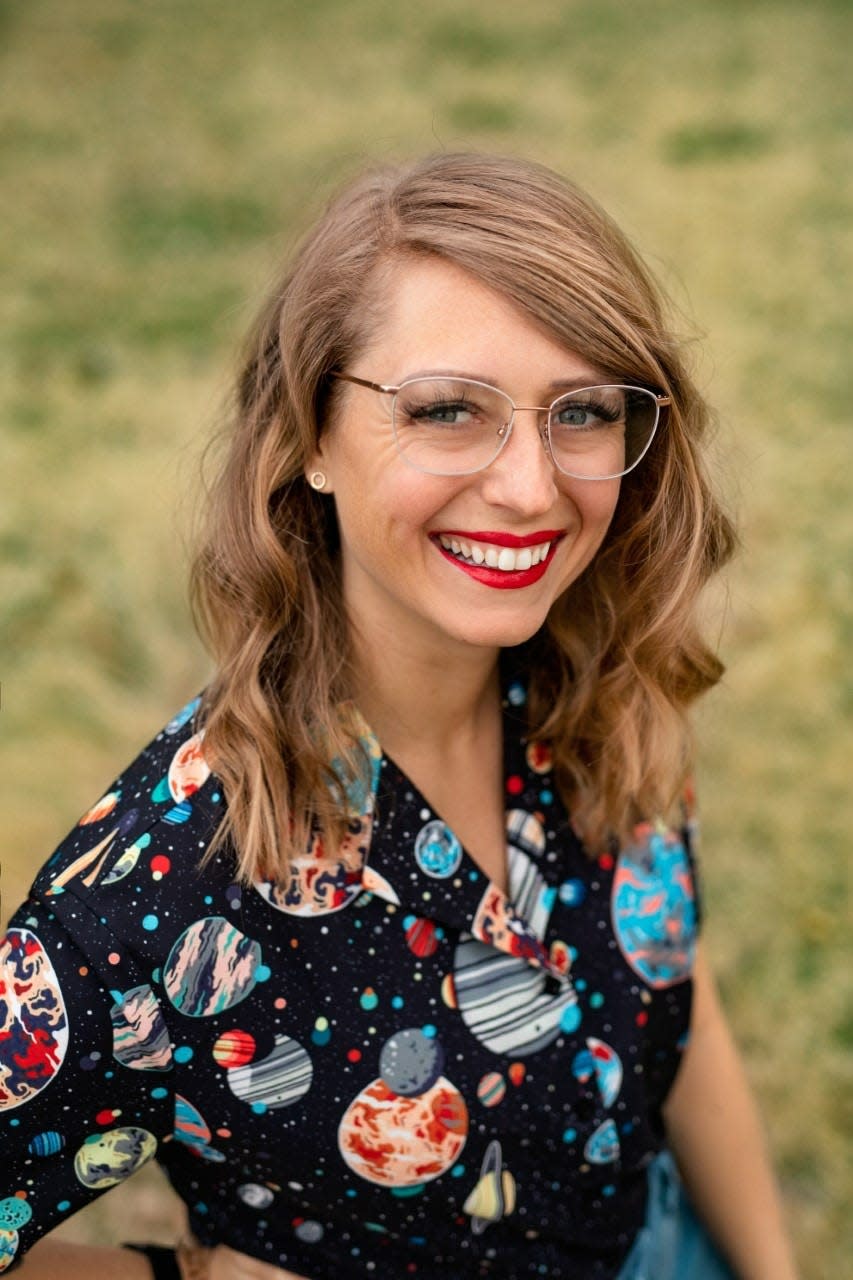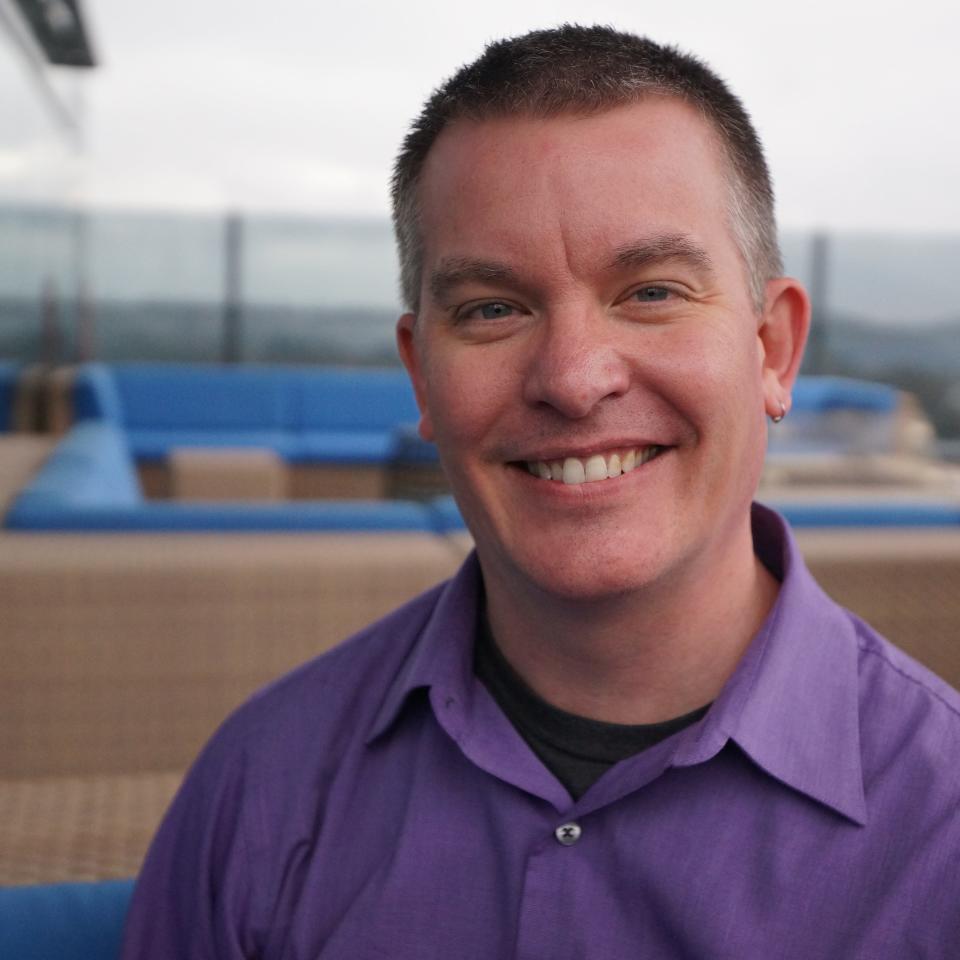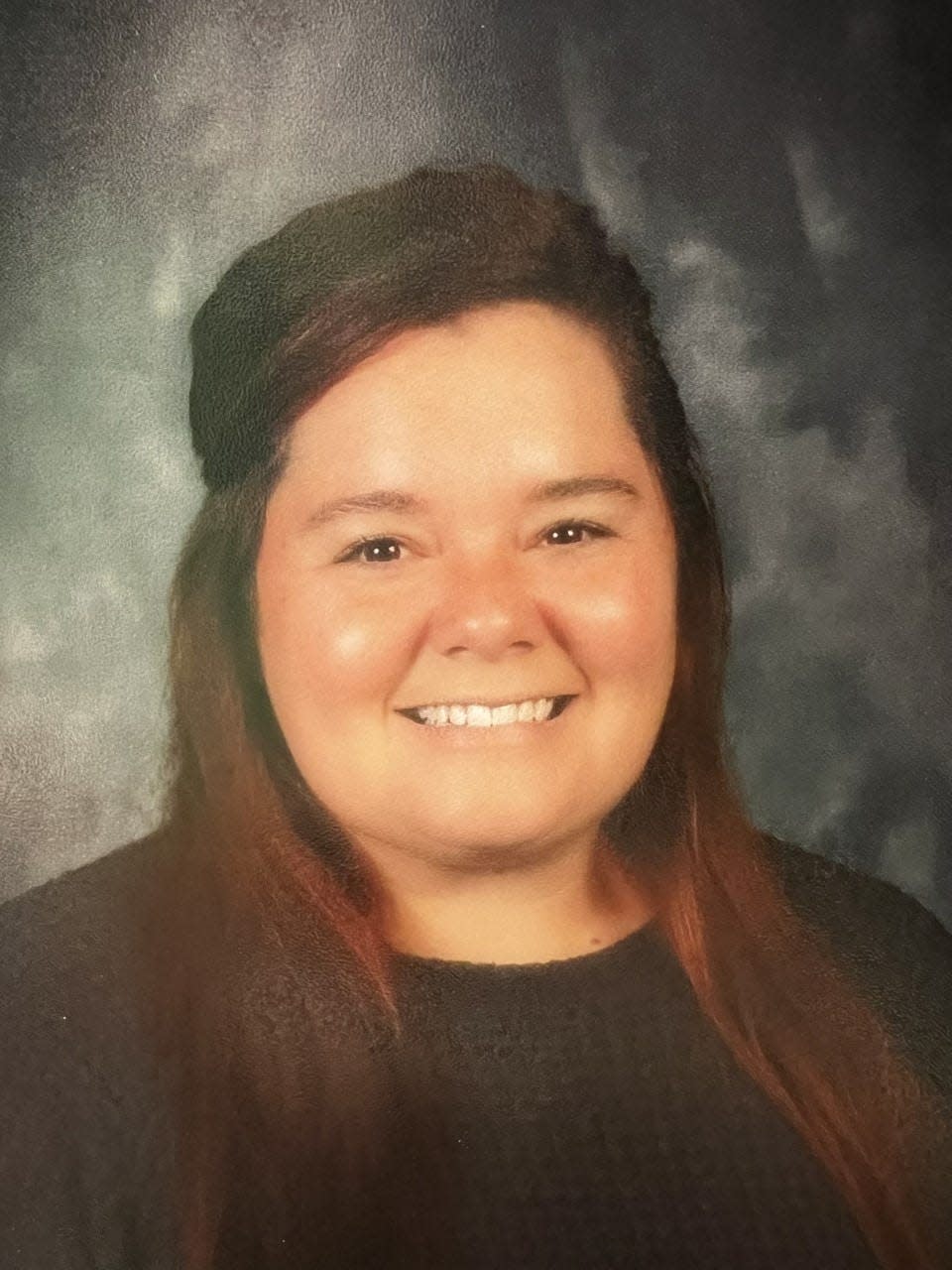Evansville's Outstanding Educator of the Year 2023: Here are the 3 high school finalists
Each year, four Vanderburgh County educators are recognized for their love of teaching and commitment to local students.
The Outstanding Educators of the Year awards are sponsored by Liberty Federal Credit Union, the Courier & Press and the University of Evansville. In their 32nd year, the awards honor the dedication and contributions of Vanderburgh County K-12 educators at public and nonpublic schools that have at least three years in the profession.
Awards are given in four categories: elementary school, middle school, high school and principal. Winners will be announced later in the spring.
More:Evansville's Outstanding Educator of the Year 2023: Here are the 3 elementary finalists
Meet this year's high school finalists for Outstanding Educator of the Year:
Lindsay Scott, Earth and space science and principles of teaching and learning teacher, Harwood Career and Preparatory High Schoo
How many years have you been an educator?
This is my 12th year teaching. However, I feel my passion for education began many years before I started my first official teaching job back in 2010.
What was your background in education before starting your current role?
Throughout my college career (2006-2010), I was a private tutor for numerous age ranges. My junior and senior years of college, I worked as the youth coordinator for a program called Impact Evansville, an after-school tutoring program for inner-city youth ages K-12.
Another part of my experience with Impact was creating and hosting the Future Business Leaders of Evansville Summer Camp, during which high school students learned how to fill out job applications, answer interview questions, and work different roles that help a business run. Post-college, the first teaching position that was offered to me was not necessarily in my area of expertise, but I jumped at the opportunity to be in the classroom right after graduating.

From 2010-2014, I worked as the K-8 art teacher for multiple schools throughout the Evansville Diocese. In 2015, I had the opportunity to branch out and teach sixth grade math and seventh grade science, English language arts, social studies, and literature at St. Bernard Catholic School.
Although I grew very close to my students that year, the commute to and from Rockport from Evansville was not ideal for me, and in 2016 I applied for an open position at Harwood Career and Preparatory High School, and I have been working here as a proud Harwood Hawk ever since.
What made you decide you wanted to be an educator?
I never had that “a-ha!” moment. It was more of a gradual self-awareness/understanding as I grew up: this is what I do naturally, so why not make a career of it? Even from my younger elementary years, I wanted to help. If you were to ask my mother about it, I’m sure a wave of stress would shadow her face as she recalled the multiple parent-teacher conferences she attended, accompanied by report card marks for excessive talking, during my own K-5 experience.
“Lindsay is a bright student,” teachers would explain to her. “But she struggles with focusing because she is very social during instruction.”
In my eyes, I was “helping” other students in the classroom. I wanted to show how each assignment was done. I wanted to explain. I wanted to assist. I have always wanted to teach.
What are the challenges you face in education today? And how do you overcome them?
Managing behaviors, creating lessons, funding classroom activities, balancing work/home life, attending professional development, handling social/emotional needs of students are obstacles that every teacher is expected to manage on a daily basis, all while maintaining the overlying goal of student learning.
I believe the most challenging component of being a teacher is overcoming these obstacles to ensure students are actually learning. I have found that all these aspects of teaching usually fall into a manageable place when I focus on one element: engagement.
It is so easy to be focused on students gaining factual knowledge: memorizing new vocabulary, sight words, times tables, etc. However, if I am memorizing something just because I have to − something that I am not truly interested in learning − that content isn’t truly sinking in.
How many things have I forgotten since I was in high school? I’m sure you can agree, if it didn’t seem important then, it has most likely left the cranial building as of today. Creating engaging lessons that help students develop a sense of curiosity and wonder over content vs. simply just knowing the content is truly the key to academic success in any classroom.
What’s your favorite thing about being an educator?
Every passionate teacher’s answer to this question will be the same: it’s the students. It’s the rewarding experience of watching them grow as people and experience life changes along the way. My favorite part about building relationships with my students is watching them become successful. I emphasize at the beginning of each semester that nobody starts a learning experience with success. It wouldn’t be considered a learning experience if that were the case.
Watching a student's attitude towards school change from “I can’t do this,” to “Watch what I can do!” is extremely powerful for all parties involved in that learning process. It’s even more amazing to watch them continue to grow and become a part of our Evansville community after they graduate.
What makes you unique in your field?
Harwood is an alternative high school. Our student body is comprised of people who have difficulty learning in a traditional education setting. Our mission is to provide meaningful learning experiences to all students. Our core values are to use kindness, build respectful relationships, show empathy, and hold our students to high expectations, pushing them to be at their academic and personal best.
Because our students have struggled in traditional settings in the past, it is especially important to me, personally, to make sure that our mission and core values are not only shown in my classroom, but also for students to take ownership of these values themselves.
Education is incredibly important, and I strive to build personal relationships with each of my students to show them that it is not only okay to learn in a non-traditional setting, but it is actually a good thing. Learning doesn't always look like taking notes, answering questions, and following instructions; it should look like collaborating, debating, asking why or how, and discussing differences in opinions.
Students often come to Harwood with a jaded view of the education system. They feel like something is wrong with the way they learn. It is my duty to change that point of view. Nothing is wrong with the way my students learn; rather it is up to me, as a teacher, to ignite that spark in each individual that craves to know more.
I want my students to see that school is not a place people go to “get fixed”, but it’s a place we go to get lost in ideas, wonder, and encouragement. When this change in perspective happens in a student, they begin to take ownership of Harwood's core values, which leads to students taking ownership of and seeing value in their own education.
Tim Wilhelmus, English teacher, Central High School
How many years have you held your current position?
I have been on a teacher contract since 1995. I taught at Bosse, then North, and then spent 10 years as an eLearning coach and Innovation, Curriculum, and Technology Specialist with the EVSC (which basically meant I was teaching teachers). In 2020, I returned to the classroom at Central, and I plan to stay here until they get tired of me.
What was your background in education before starting in your current role?
I come from a family of educators, so I grew up knowing the life of a teacher. Because of this, my parents reinforced the values and habits of mind related to life-long learning. I loved school, and I had a lot of wonderful teachers as role models, so it wasn't a stretch for me to end up as a teacher. Over my career, I have had the good fortune to teach in several different schools and contexts. All of those experiences have given me a broad perspective on how different students learn. This has helped me not only as a teacher at Central, but in the Medical Professions Academy, where I teach students from all over the city.

What made you decide you wanted to be an educator?
When I first graduated from college, I taught a class as an adjunct professor for conditionally admitted students at USI and I really enjoyed it. Then, I moved to Bloomington to pursue a creative writing degree at IU. One day, I was walking across campus, and I decided to cut through the new Wright Education building. It was such a cool building, filled with technology, bright colors, and a palpable energy. I wondered at that moment what it would take to get my teaching certification, and I walked directly into their counseling department and asked.
Someone was available right then to meet with me (which never happens), and within an hour, we had pulled my transcripts, developed a plan, and filled out the paperwork. The next day, I received my acceptance in the mail. I haven't looked back since.
What are the challenges you face in education today? And how do you overcome them?
The biggest challenges in education today are the same as the biggest challenges in the world today. First, COVID was hard on everyone, and it has demanded a lot in terms of adjusting to new realities for students. For example, some students are still processing trauma, while others fell behind in their skills development. Still others have had to learn to balance new responsibilities due to the financial strains on their families.
I overcome these by being flexible and meeting students where they are to move them forward as thinkers, readers, and writers.
Second, the polarization of our politics is making teachers’ jobs more challenging. Some days it feels like people can only tolerate hearing what confirms their beliefs of how the world should be, and they want to micromanage what school should look like. I overcome this by focusing on the community in my classroom and listening to what my students right now need from me, and by creating a safe space for my students to be who they are and to explore important ideas in ways that encourage empathy, reflection, and strong reasoning.
I treat my students like the individuals they are, and I think they appreciate that.
Third, the world seems to be a pretty challenging place right now. We live in a time of great change, and technology seems to amplify the impact of a world that is dealing with multiple crises at once. My students are facing stressors that I never had to face, and they are carrying the weight of decisions that were made before they were born. I overcome this by working to remind my students of the joyous and wondrous parts of life. My classroom is built to reduce stress and inspire positivity. I hope my class can be a reminder of how good life can be, and how we have the power to find the solutions to the problems we face.
What's your favorite thing about being an educator?
The time I get to spend with the kids. I truly love being around them, building strong relationships, and creating fun ways to use our brains together. I hope I can be a positive role model for all students and that I can inspire some of them to take up the role of teacher in their own lives. During the time I was away from the classroom as a coach, I constantly missed the daily interactions with kids, the inside jokes that occur with classes, the discoveries students make about themselves, each other, and the world around them. Even though I may only get 180 hours with a student, I appreciate that time, and I work to make the most of it.
What makes you unique in your field?
I decided to ask my students their thoughts on this. The gist of their response was that I participate in the learning process with them. They shared that I make it clear that I like sharing time with them, that I am happy to be in class, and that I am happy that they are in class with me. At the same time, they said I spend time talking with them about our work and that I see myself as a peer who is open to being challenged. They said they like that I don’t feel the need to be right or to be the only authority in the room.
From my perspective, my uniqueness comes in the form of creating a classroom that is an inspiring environment in which to learn. I personally need to feel inspired and relaxed to do my best work, so I designed my room as a real celebration space, full of color and positive messaging. I look for ways to constantly engage my students' senses.
Everyday we find something to celebrate, and I build in time to get to know what is going on in my students' lives. The lessons I design are meant to give kids opportunities to reflect on their learning and to share their voices. I push students to realize that they have the power to make their world what they want it to be. I build a culture of care in which we all prioritize lifting one another up, and in which it is always possible to recover from our mistakes.
Kayla Pirillo, government and history teacher, Central High School
How many years have you been an educator?
I have been in the classroom for 10 years. Since Day One, I have taught courses I absolutely love and I get to share that love with my students. Those courses have ranged from United States Government, United States History, AP United States History (APUSH), and AP World History Modern.
What was your background in education before starting your current role?
Central has been my home since day one. Central’s diversity gives my classes an opportunity to see topics we discuss from multiple lenses. I am not sure I could imagine myself anywhere else. Prior to Central, I was fortunate to assist in freshman U.S. history courses at Kentucky Wesleyan and tutor students who needed assistance.
This opportunity gave me a perspective on what skills students often lacked coming into college which is now a huge focus in my classroom. I cannot thank that college enough for molding me into the educator I am today.

What made you decide you wanted to be an educator?
My first history professor opened my eyes to histories I had never heard of, let alone understood. She taught me to process and reflect what we were learning and demonstrate our knowledge by sharing our viewpoints. She was also the first educator in my life that expected me to ask questions to gain knowledge: “If you want to know something, ask a question and continue learning till you find the answer.”
Her discussions and reflections helped me understand what I was learning. I only hope my students leave my classes each year with those same skills.
What are the challenges you face in education today? And how do you overcome them?
My students' fear of failure outweighs their rewards of growth and success. Often relying on others to accomplish tasks. In class they become self-reliant, acquiring skills such as time management and organization to gain their own knowledge.
They share their knowledge in discussion and learn to listen and process before responding with their thoughts. They learn that ideas can change as their knowledge grows through communication.
Through that growth, they gain the patience to assist others in learning. These skills cannot be measured on a standardized test but they will be crucial when leading the future.
What’s your favorite thing about being an educator?
There is this moment during discussion, when two students take the opposite stance on an argument, both sides are valid but their evidence and reasoning contradict. The rest of the class can flop their stance as the conversation continues but watching them be able to support themselves because they did the work and have validity in their arguments is exciting.
However, when they conclude that it is possible that both sides are right because their evidence is valid and supports their stance, that is the real win. Those moments show them the validity of experience and accepting more than their own opinion perspective.
What makes you unique in your field?
I like to solve problems and find answers to big questions, but I think that I am not afraid to ask for help when I need it. Being in a leadership position, we can find it challenging to ask for help if we are the ones that are supposed to be giving the answers.
However, asking for help makes us personable and it also makes us easier to approach when someone needs our help. I only hope that both my colleagues and students feel they can ask me for help when they truly need it.
This article originally appeared on Evansville Courier & Press: Evansville Outstanding Educator of the Year 2022: High school finalists

